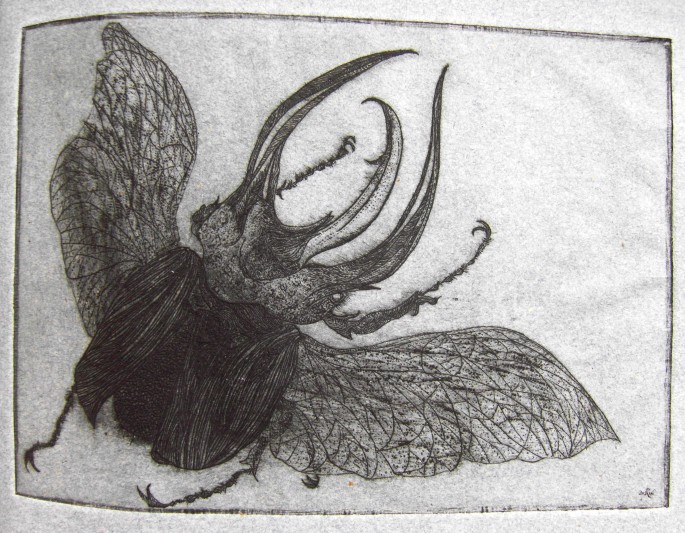Horned Beetles is the first édition de luxe from the Gehenna Press. Arguably the most beautiful of all its illustrated books, it formed a significant step in the development of private press books of the period. It is the first book from the Press to use etchings, made by Leonard Baskin with the combination of detail, colour and texture that was to define the best Gehenna books. The illustrations of beetles, described by Baskin as 'in realistic and fantastic guises' are printed in a range of colours, on hand-made English, Italian, French, Japanese, and 19th-century Swiss papers. The binding, in full blue morocco, is by the Harcourt Bindery, Boston.
The edition was limited to thirty copies. There are no institutional holdings listed in the United Kingdom: the ten other copies that appear in library catalogues are all held in the United States. This copy was given by Leonard Baskin to Nelson Rockefeller in September 1958. Baskin established the Gehenna Press in 1942, while a student at Yale. The Press flourished for some sixty years, and produced over a hundred books, creating the most successful private press of all time. Baskin’s collaborations with poets and painters included his life-long friend Ted Hughes.
The Bodleian Library holds an archive of Gehenna Press papers, mostly from 1973-2005. This comprises the proofs and printing material of the Press's publications from 1981-2005, beginning with the first collaboration with Ted Hughes, A Primer of Birds, and shows the many stages in the production of each book. The archive includes some etching plates and woodblocks, an Albion printing press made in 1877, administrative papers and correspondence, papers and correspondence relating to exhibitions of the Press's books, a small sequence of the personal correspondence and papers of Leonard and his wife Lisa Baskin, and photographs.
Horned Beetles is a welcome accession to the Bodleian Library's collections, given the many Gehenna Press books it already holds, as well as to the Press's archive.
This grant was awarded from FNL's B. H. Breslauer Fund, thanks to the generosity of the President and Officers of the B. H. Breslauer Foundation.
